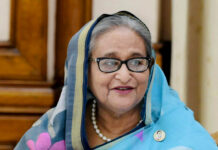
With the political crisis over the mode of a polls-time cabinet still unresolved, the High Court has come up with two formulas for the interim government to assist the Election Commission in holding the next two parliamentary elections.
The first formula allows the incumbent prime minister to lead an election-time cabinet consisting of 50 new ministers from all parties; the second provides the main opposition party with the opportunity to govern the country for the last one year of the five-year tenure of a parliament.
The HC, however, has stressed the need for building up different constitutional and statutory bodies for resolving the dispute over handing over power to the interim government.
“No formula can help the nation in resolving the eternal dispute regarding peaceful handover of power following the completion of the term of an elected government until or unless the political parties are sincere and serious in building up different constitutional and statutory bodies,” it observed.
The HC has provided the formulas and observations in its full judgment on uncontested election of 153 MPs in the 10th parliamentary election held on January 5, 2014. The copy of the full verdict was released at the end of last month. The Daily Star yesterday obtained a copy.
Cancellation of the caretaker government in 2011 through a constitutional amendment by the then Awami League-led government prompted the BNP-led alliance to boycott the January 5 parliamentary polls, which recorded an unprecedented number of victories of uncontested MPs due to the boycott.
The legality of the unopposed election was challenged with the HC in a writ petition filed by a Jatiya Party leader.
The HC Division bench consisting of Justice Mirza Hussain Haider and Justice Muhammad Khurshid Alam Sarkar delivered the verdict on June 19, 2014, saying there is no scope to question the legality of those who were elected uncontested in the January 5 polls.
In his petition, JP leader Khondoker Abdus Salam prayed for the restoration of the now defunct caretaker government system or at least for an acceptable form of the election-time interim government.
FORMULA ONE
According to the first formula provided by the HC, a fresh cabinet consisting of 50 new ministers will be formed by the current prime minister ahead of the 11th parliamentary election.
MPs of all the political parties representing the current parliament will be made ministers of the election-time cabinet. The ratio of representation of each party may be assessed from the percentage of votes that a political party secured in the 10th parliamentary election.
However, the BNP and Jamaat-e-Islami will have no representation in this cabinet as the two parties along with others boycotted the polls.
To ensure their participation, the HC proposed inclusion of five technocrat ministers in the cabinet who will come from the parties that boycotted the last parliamentary election.
This cabinet may be formed 90 days before the completion of the five-year tenure of the current parliament or after dissolution of the parliament given it is dissolved suddenly, according to the formula.
The HC has also spoken about distribution of important portfolios — home affairs, public administration, finance, law, foreign and defence portfolios.
It proposed distribution of these important portfolios among the parties representing the parliament through lottery to avoid controversy.
The 12th parliamentary election can also be held under this formula.
FORMULA TWO
The HC’s second formula speaks about sharing of power between the ruling and main opposition parties in parliament.
The majority party, according to the second formula, would govern the country for the first four years, and then the main opposition would take over and run the country for the remaining one year.
The main opposition would be deemed qualified to run the country only if it secured at least half of the votes secured by the winning party in the last parliamentary election. Then the interim cabinet will be formed by the leader of the majority party in accordance with the first formula.
If the main opposition fails to secure the said amount of votes, the majority party shall govern the country for the five-year tenure, according to the second formula.
The constitution needs to be amended for implementing the second formula. No amendment is required for the first formula however, said the HC.
OTHER SUGGESTIONS
Alongside the two formulas, the HC also suggested providing the EC with the power to overturn the orders or decisions of any minister and even of the prime minister on a cogent reason with an explanation thereto through a public notice.
Arranging a free, fair and impartial national election, be it before the completion of the five-year term or on completion of the tenure, is the most important Constitutional duty of the state, among all other Constitutional functions, as engraved in different provisions of our Constitution as without the national election, no one can conceive democracy or the operation of rule of law in the country, it stated.
“Therefore, it is the foremost duty of all the political parties of the country to maintain an election friendly atmosphere immediately before the national election and to continue the same till completion of the election so as to enable the Election Commission to perform its Constitutional duties,” continued the HC.
For this, all the political parties are required to abstain from raising any agitation in the streets or from undertaking any violent political programme.
“The above formula may be a way out from the confrontational politics practiced by the political parties of Bangladesh and instead stepping forward towards the road of democracy,” it added.
Stressing the need for making functional the various government divisions and departments with a patriotic zeal, the HC said the member of civil service, police, judiciary and the EC should be trained in a good working environment throughout their service career.
This would urge them to carry out their respective functions and duties during the national elections without being influenced by any political ideology but instead, always being guided by the great spirit and the high ideals of our national independence which was achieved through the sacrifice of million lives, it continued.
“Otherwise, whatever the best formula for election time Government is devised and incorporated in our Constitution, it would still not work in our country because the interested quarters would eventually be seeking to make the system controversial and dysfunctional on this or that pleas as happened in the case of the Non-Political Caretaker Government, a formula which was invented by all the political parties of this country but failed to get a permanent place in our Constitution as its provisions were misused by the vested quarters and thus the Apex Court gave its consent to annul the system,” the HC observed.
The HC has also explained the rationale behind its formulas. It said the judges of this court, being the citizens of this land, cannot overlook the issue which attempts to jeopardise the lives of the public and the national interest in the course of adjudication upon the constitutional issues.
“We, the judges of this Court, are oath-bound to defend the Constitution, the sacred parchment which we have achieved through the great Liberation War.” the court asserted.
Contacted, Law Minister Anisul Huq declined to make any comment about the HC formulas.
“I will not make any comment without going through the judgment,” he told The Daily Star.
A senior BNP leader, who is also a Supreme Court lawyer, also declined to comment on the formulas.
Hassan MS Azim, the writ petitioners’ lawyer, told this correspondent that his client is yet to decide whether he will move an appeal before the Appellate Division of the Supreme Court against the High Court verdict.
“We will go through the judgment of the High Court and analyse its findings and observations carefully and then we will decide whether we will file an appeal against the verdict or not,” he said.
Source: The Daily Star










Neither of these are democratically credible. Holding of election either under a care-taker government (a concept that BAL itself invented and got going until now) or under a neutral government plus a re-consituted indepedendent Election Commission with the seating government having no executive role in the conduct of the election is the only answer to the corruption of election process created by this government.